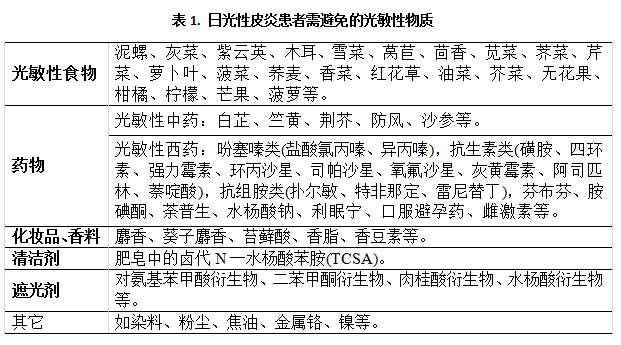Sunburn in early summer? Dermatologists remind: beware of “skin diseases” on the tip of the tongue

Many people feel that the sunshine in spring is mild and comfortable, but they don’t know that spring, especially late spring and early summer, is the high incidence period of actinic skin diseases. Special attention should be paid to sun protection, and some places with relatively open environments, such as seasides, lakesides, sand pools, etc. It is more violent, and there are many seasonal foods at this time, such as coriander, spinach, mango, pineapple, etc., which are “photosensitive foods”, and you must be careful to be targeted by “solar dermatitis”.
Dealing with solar dermatitis correctly in late spring and early summer
According to Zhang Junling, Chief Physician of the First Dermatology Department of the Affiliated Hospital of Academia Sinica, solar dermatitis, also known as actinic dermatosis, is a series of skin lesions caused by ultraviolet radiation. The skin lesions are mainly distributed in the exposed parts, which have a negative impact on the patient’s image and life that cannot be underestimated. As we all know, people’s living consumption level is increasing day by day, the development of tourism is booming day by day, the prolongation of the time exposed to the outdoors and the destruction of the ozone layer with environmental pollution, the incidence of photosensitive skin diseases is increasing day by day. According to the statistical analysis of clinical data at home and abroad, early summer is the season of high incidence of actinic dermatosis.
Director Zhang Junling said that there are many types of actinic skin diseases, including acute skin damage and chronic damage caused by sunlight (including photoaging, sunburn and tanning), photosensitive skin diseases (including idiopathic photosensitive skin diseases and exogenous photosensitizers involved in the induction of photosensitive skin diseases), light-induced or exacerbated diseases (including connective tissue diseases, pigmented skin diseases, seborrheic skin diseases) and actinic tumors (including basal cell carcinoma, squamous cell carcinoma carcinoma, melanoma, and actinic keratoses).
Notice!Eating these foods and medicines will increase the chance of tanning and sunburn
Patients with actinic dermatosis should try to avoid photosensitive foods, such as mud snails, gray vegetables, milk vetch, fungus, pickled vegetables, lettuce, fennel, amaranth, shepherd’s purse, celery, radish leaves, spinach, buckwheat, coriander , safflower, rapeseed, mustard greens, figs, citrus, lemon, mango, pineapple, etc. Drugs (see Table 1 for details), please pay attention to avoid contact in daily life.
Ultraviolet rays are everywhere, how to effectively prevent solar dermatitis? Director Zhang Junling gave professional advice, try to avoid exposure to the sun and related allergens, and at the same time apply sunscreen according to the results of the photosensitivity test. For patients with hypersensitivity to ultraviolet rays, it is recommended to strictly avoid light. Avoiding exposure to ultraviolet light requires physical action. The suggestions are as follows: Try to avoid going out from 11:00 am to 3:00 pm. At this time, ultraviolet rays are the strongest. Even if you go out, try to walk in the shade. It is recommended to wear long-sleeved clothing, pants and long skirts, preferably made of cotton and linen. It is recommended to install UV protection film on the windows of the living room and the windshield of the car. For patients with visible light sensitivity, it is recommended to wear dark clothing. Because strict avoidance of light can cause some side effects, such as vitamin D imbalance, calcium and vitamin D supplementation is also very important for the elderly.
Finally, director Zhang Junling reminded the general public and patients that in the early summer, everyone should remember to protect themselves from sun protection when going out to play, and actively prevent the occurrence of solar dermatitis. If local discomfort occurs after sun exposure, you can apply cold compresses for treatment. If you do not see obvious relief, please seek medical treatment in time. The Dermatology Department of the Affiliated Hospital of Academia Sinica will escort your skin health!

![[Love Wants Sexual Happiness Series 358]Find the culprit and overcome psychogenic erectile dysfunction. Don’t let pressure affect your sexual happiness. [Love Wants Sexual Happiness Series 358]Find the culprit and overcome psychogenic erectile dysfunction. Don’t let pressure affect your sexual happiness.](https://webcdn.guangming.com.my/wp-content/uploads/2024/04/171111-780x420.jpg)

![[Wanqingyi Care]My health, my rights, customized medical methods in the last stage of life [Wanqingyi Care]My health, my rights, customized medical methods in the last stage of life](https://webcdn.guangming.com.my/wp-content/uploads/2024/04/ZZ1-100-780x420.jpg)
![[Kidney Transplantation Special Topic]The survival rate of transplanted kidneys is high without dialysis treatment three times a week [Kidney Transplantation Special Topic]The survival rate of transplanted kidneys is high without dialysis treatment three times a week](https://webcdn.guangming.com.my/wp-content/uploads/2024/04/1311-780x420.jpg)



